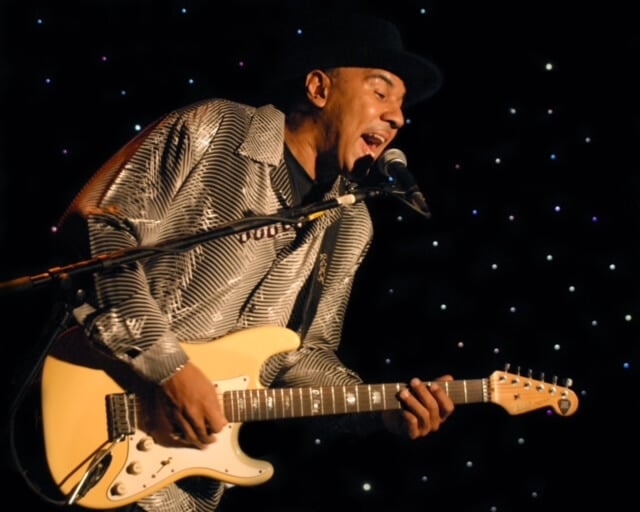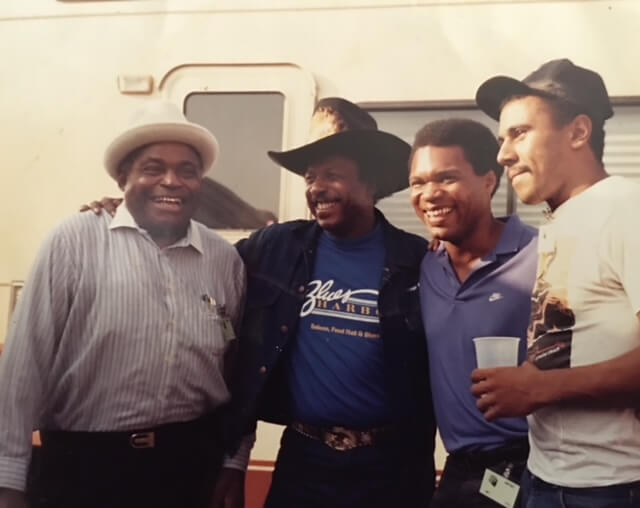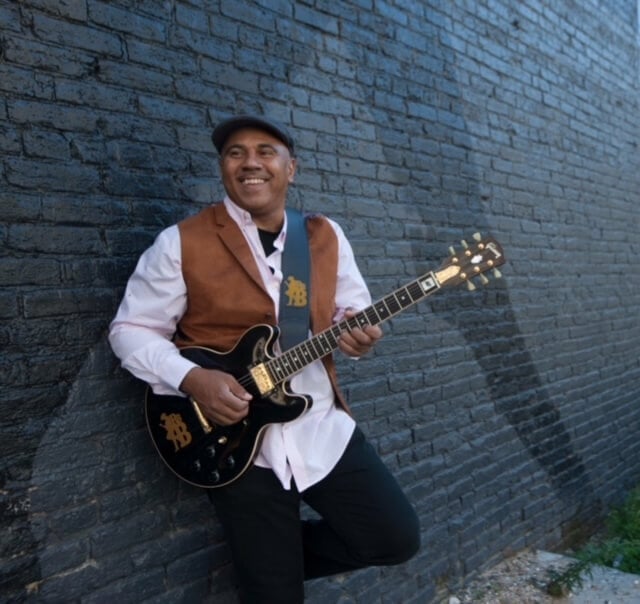Blues Master Ronnie Baker Brooks on Family Legacy and Staying Current in a Modern Age

Photo by Suzanne Foschino
Let’s talk about your beginnings as a guitar player. Your father is the late Lonnie Brooks, a famous Chicago bluesman who started performing in Chicago in 1960. Your younger brother is Wayne Baker Brooks, also a touring guitar player and solo artist. Did your father ever teach you and your brother any guitar licks?
Oh yeah man, there was always music and an instrument around the house (laughs). From my early beginnings of walking around the house, I remember seeing guitars or some kind of instrument around the house or record player, some kind of radio. Once my father saw that I was interested, he immediately started teaching me and he inspired me and Wayne to write material. Like if you write a song, I’ll give you a dollar. I remember one particular day; I was asking dad for a dollar to go buy some candy and he said write me a song. I went in there and wrote a song and he gave me the dollar.
Who were some of your other early influences?
Of course, my dad. We would imitate dad with a broom, walking around the house or jumping on the bed like we were in a stadium…trying to be like [him]. He was our main influence and still is to this day. It’s like I look at my dad the way some people look at Elvis Presley or Jay-Z. He’s my superhero and matter of fact I wrote a song entitled “Hero” for him.
He would be my first major influence and the one person that started a fire and then Mr. Albert Collins threw gas on it. Albert Collins was really good friends with my dad and Albert was like an uncle to me. I had the pleasure of going to shows with him and pick his brain, he would instill confidence in me at a very crucial time in my development. To have someone of that stature tell you something positive or give you advice, that was priceless.
I would say Albert Collins was a huge influence, also Koko Taylor. These are people I was hanging around cause my father and of course I got to meet Bernard Allison, son of Luther Allison.
You mentioned to me before that you knew Willie Dixon and B.B King. Did Willie Dixon ever tell you any memorable stories about Chess Records? Or did B.B tell you any stories?
Oh yeah, I’ve heard many stories from both of them. The one that sticks with me from Willie I’ll never forget – I sent you a picture of Willie Dixon, my dad, Robert Cray and myself. It was kind of like generations in order – around that time I had started to sing a little bit and I was very young. My dad asked Willie to give me some pointers on singing and Willie said “Well ya know if you wanna be a singer, you gotta learn how to deliver the song.” Then he picked up a piece of paper and start tapping on it and he started singing and said, “You gotta deliver the song and stay in the pocket. Howlin Wolf wasn’t what you call a great singer, but he had a style. He had his own style and he knew how to deliver the song, you’ve got to learn how to deliver the song.”
You do a really good job of engaging the crowd when you perform live. You start clapping your hands and getting the audience involved. Where did you develop your stage presence?
Playing with Lonnie Brooks (laughs). I learned from the best and because I was with him every night…So, I learned a lot from playing with dad and being around him and his friends – we did a lot of shows with Koko Taylor, Albert Collins, B.B King, we did a lot of shows with many of the greats…Buddy Guy, Junior Wells, played with lots of those guys and I saw what worked. I’ll never forget B.B King pulled me to the side in Miami and said, “Man, I watch you watch me every night and I wish we had something like this when I was your age. Learn all you can from us and apply it to your thing. Just know your dad is just as good as I am or better, we just have different styles. “
That resonated with me man, I’d watch them pull out their magic every night, every night they’d pull the rabbit out of the hat.

Willie Dixon, Lonnie Brooks, Robert Cray and RBB 1986
What are your favorite songs to perform?
Whatever the people like (laughs). My whole thing is I love seeing people happy and if I can make people happy playing music, that’s double the pleasure.
Are there any other hobbies or activities outside of music that help you hone your game onstage? Like doing yoga/meditation or playing sports?
I used to play a lot of sports when I was younger, of course my knees aren’t as young as they used to be (laughs). We love playing games, that’s my life now. I used to be out in the streets, playing basketball or some physical activity. Of course, I always try to meditate and [I’m] trying to stay healthy now cause I’m older and I’m trying to change my life a little bit.
Let’s talk about your blues playing techniques for a minute – you use a good amount of tremolo picking and open string phrasing similar to Stevie Ray Vaughan. Did you get a lot of your technique from listening to him? Who else did you get your technique from?
I heard all of the stuff at home and then I heard Stevie Ray Vaughan and was like oh yeah! Cause Stevie was much younger than my dad and we were crazy about Stevie Ray Vaughan. I was so crazy about Stevie, my dad had to check me. He said you go and find where Stevie got it from. He was like don’t just copy him, dig deeper.
This is just my personal opinion, but I feel Albert King smoked Stevie on a lot of those solos. And I know Stevie was holding back, but on that “I’m Going to Move to the Outskirts of Town” and “Matchbox Blues,” man I got into Albert King from watching that video In Session and I had purchased that DVD to see Stevie Ray Vaughan.
Ain’t that something. I was into Stevie so big though because he brought another energy into the blues that I could relate to — he was younger, he brought some kind of youth to it where it was current for me. Man, my dad played that tape for me, it was like 2am and I was in a dead sleep and I saw this white guy playing Albert King licks with flash. I said who is this dude?!
My dad said that’s my friend Stevie Ray Vaughan and I was absorbed after that moment. The open string stuff I had heard my dad do, cause my dad is from Texas. Stevie invited me and my dad to one of his shows and I told Stevie he was one of my heroes and he told me my father was one of his heroes. My dad was telling me about how Stevie was asking him about his album on Capitol Records “Broke & Hungry,” Stevie was asking him how he got his tone, what kind of strings he was using, this was years before he became famous. So, you can hear that Texas influence from Stevie and that was how I connected the dots from my dad because my dad was playing a lot of that open string stuff like Freddie King and lot of those guys from Texas.

Photo by Paul Natkin
I was watching some older footage of you from your European tour in 2010-11. You were using a Stratocaster with what looked like Lace Sensor pickups. Now it looks like you’re using mainly semi-hollowbody guitars, is that correct?
I was fortunate to have that guitar made by Gibson for me, it’s one of one. A friend of mine actually had it made for me and it’s hard to put down. When you’re playing the blues, I love playing Strats.
What’s your current pedalboard and amp setup?
When I’m not using rental gear, I use two Deluxe Reverbs and on my pedalboard I use two Tube Screamers, I got a Vox wah wah, a chorus pedal, I got an OCD pedal when I want some more gas and a Univibe when I play “See You Hurt No More” and that’s it.
Let’s talk about your new record. You’ve worked with some amazing producers in the past – Jellybean Johnson (produced Janet Jackson and Alexander O’Neal), Steve Jordan, he’s drummed for John Mayer and the Rolling Stones. Who produced your most recent album?
The one that’s not released is me and Todd, Todd from Big Head Todd and the Monsters. I flew up to Denver and he told me don’t bring no guitars, just you. In the middle of a pandemic, I wrapped up every hole in my body, covered up everything and stayed at his house and they’ve got the home studio at Jeremy, the keyboard player’s house. We locked ourselves in there, the three of us socially distanced, and we cut the record, man. Let me tell you, that was so healing for me. My wife pushed me during that whole time because I was worried about how are going to pay the bills and she was like you know what, you should just play live on Facebook. I started doing the Facebook Live thing and that generated some ideas for songs and old songs that I had that were never released.
Then she hit me again, I said I should do a record like this and she said you know what talk to Todd and I immediately Facetimed Todd. He was like Ronnie, yes, whatever you want let’s do it! Just get here safely. It was awesome, it was a healing thing for me. I hadn’t been around people other than my family and someone musical like Todd, the ideas just started flowing and I’m very proud of that moment. It hasn’t been released yet, but I’m very proud of it.
“Hero” is one of my favorite tracks off the new album. I wrote the song mainly about my dad, but it’s saying we need a hero now. We’re going through all these problems right now and we need a hero to save us. All through my life, prior to my father passing, he was my hero. But with something like the pandemic going on or anything tragic, he was my go-to person and gave me that sense of security.
There’s another track called “From the Root to the fruit” which is a little more updated, kind of a hip-hop vibe, but it’s like a bridge between the blues and hip-hop. There’s some songs on there that are kind of like a bridge. I got another on there called “Troubling Times” and a lot of that stuff was inspired during the pandemic [too].
Follow on Instagram @ronnie_baker_brooks
